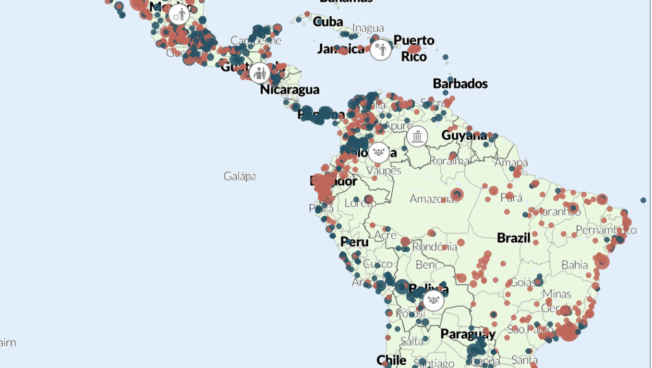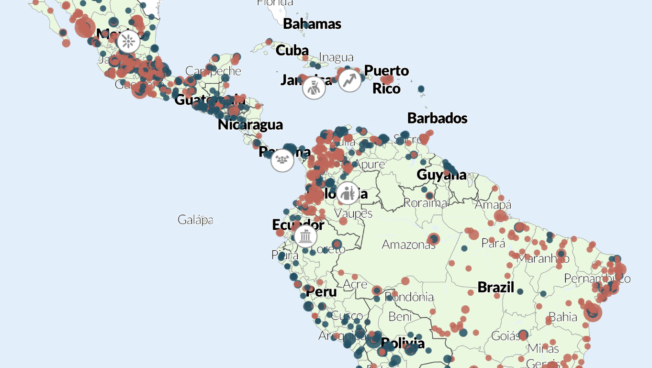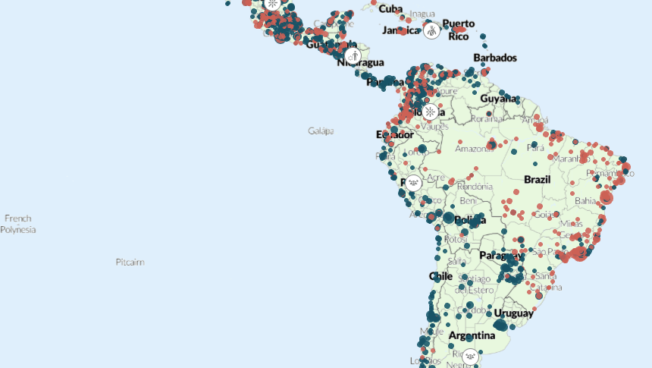Regional Overview
Latin America and the Caribbean
November 2024
Posted: 9 December 2024
In this Regional Overview
- Bolivia: Pro-Morales demonstrations decrease despite persisting political and economic tensions
- Brazil: An attack against the Supreme Court highlights political tensions over aborted coup attempt investigations
- Haiti: Viv Ansanm exploits political infighting to escalate violence in Port-au-Prince
- Mexico: Gang feuds intensify in Michoacán, Sinaloa, and Tamaulipas
- Nicaragua: Constitutional reform locks in Ortega-Murillo’s authoritarian rule
- Peru: President Boluarte faces mounting unrest over high extortion levels
Bolivia: Pro-Morales demonstrations decrease despite persisting political and economic tensions
In the first week of November, supporters of former President Evo Morales lifted their 24-day-long roadblocks that were set to demonstrate against an arrest warrant against Morales. The roadblocks had been erected in mid-October across multiple parts of the country1Laura Gamba, ‘Bolivia’s president demands end to roadblocks that have cost over $1.7B,’ Anadolu Agency, 31 October 2024 amid growing political tensions between Morales and President Luis Arce over control of the ruling Movement to Socialism (MAS) party. The decision to lift them was intended as a gesture of Morales’ willingness to engage in dialogue2The Associated Press, ‘Partidarios de Evo Morales levantan los bloqueos tras más de 20 días en Bolivia,’ 6 November 2024 and drove a 36% decrease in demonstration activity in November compared to October. However, negotiations did not follow. Instead, the Constitutional Court ratified a ban on Morales’ candidacy in the 2025 elections,3Reuters, ‘Bolivia’s Morales barred from running for political office,’ 8 November 2024 and the Supreme Electoral Tribunal handed the MAS presidency to Grover García, a supporter of the current government.4El Universal, ‘Evo Morales pierde el control del MAS tras fallo judicial,’ 26 November 2024 Although these developments appear to give Arce the upper hand, his ongoing dispute with Morales is far from resolved and will likely continue impacting the country’s political and economic stability.
Meanwhile, Arce’s government faces economic challenges resulting from fuel and dollar shortages, which have been deepened by the roadblocks.5Juan Martinez, ‘Bolivia’s Fuel Crisis: A Perfect Storm of Mismanagement and Economic Woes,’ The Rio Times, 7 November 2024 In November, several key sectors – particularly farmers and public transportation and cargo drivers – mobilized against rising living costs, accounting for over a quarter of the country’s demonstration activity. Their mobilization reached its climax on 21 November, when over 10,000 people gathered in La Paz to demand the government address the fuel shortage and take action against rising inflation.6Infobae, ‘Crisis en Bolivia: miles de manifestantes exigieron soluciones a la inflación, la falta de combustible y la escasez de dólares,’ 21 November 2024
Brazil: An attack against the Supreme Court highlights political tensions over aborted coup attempt investigations
On 13 November, a former candidate for municipal council from Santa Catarina state affiliated with the Liberal Party — former President Jair Bolsonaro’s party — detonated explosives outside the Supreme Federal Court (STF) in Brasilia.7Darcianne Diogo et al., ‘Saiba quem é o homem que causou explosão e morreu próximo ao STF,’ Correio Braziliense, 13 November 2024 The man acted alone and was killed in the attack after one of the explosives he was manipulating went off. The federal police linked the incident to the case overseen by STF judge Alexandre De Moraes concerning the 8 January 2023 riots, during which Bolsonaro supporters stormed the capitol building to prevent President Luiz Inácio Lula da Silva from taking office.8Ederson Hising, ‘Explosões perto do STF: o que se sabe e o que falta esclarecer,’ G1, 14 November 2024; BBC News Brazil, ‘Homem morre ao detonar explosivos em frente ao STF: o que se sabe até agora,’ 14 November 2024 Days later, on 19 November, authorities arrested five members of the military close to Bolsonaro for plotting to assassinate Lula, Vice President Geraldo Alckmin, and De Moraes in late 2022.9Tiago Rogero, ‘Brazilian police arrest five over plot to assassinate Lula after 2022 election win,’ The Guardian, 19 November 2024
Amid ongoing investigations into the coup plot, on 26 November, the federal police issued a report stating that Bolsonaro had knowledge and directly participated in the attempted coup.10Júlia Barbon, ‘Entenda em 8 pontos papel de Bolsonaro na trama golpista, segundo a PF,’ Folha de São Paulo, 26 November 2024 Bolsonaro is already barred from running for public office until 2030 following a separate ruling by the Superior Electoral Court in 2023.11Robert Plummer, ‘Eight-year election ban for Brazil’s Jair Bolsonaro,’ BBC, 30 June 2023 However, he is still planning a political comeback in the 2026 elections and is still quite popular in Brazil.12Bárbara Noleto, ‘Se Lula e Bolsonaro disputassem as eleições hoje, o ex-presidente venceria,’ Jornal Opção, 29 November 2024 Given the persistent political polarization in the country, investigations into Bolsonaro’s inner circle could fuel further unrest and violence from right-wing sectors, similar to the surge seen after the November 2022 presidential election.
Haiti: Viv Ansanm exploits political infighting to escalate violence in Port-au-Prince
Political tensions between the Transitional Presidential Council (TPC) and the government culminated in the removal of Prime Minister Garry Conille and the nomination of Alix Didier Fils-Aimé as the new prime minister on 11 November.13RFI, ‘Nouveau Premier ministre en Haïti: «Garry Conille pensait n’avoir de compte à rendre à personne»,’ 11 November 2024 This escalation followed a call by new TPC President Leslie Voltaire for a cabinet reshuffle. Conille countered Voltaire’s call by demanding the resignation of three TPC members implicated in a corruption scandal.14France 24, ‘Haiti’s governing council replaces prime minister amid ongoing turmoil,’ 11 November 2024 Amid this instability, the Viv Ansanm gang alliance exploited the situation to expand its territorial control. Violence surged across the Ouest department, with a 68% increase in November compared to the month prior, particularly in Port-au-Prince, Delmas, and Petionville communes. Notable incidents included attacks near Fils-Aimé’s swearing-in ceremony, the targeting of the airport, and clashes with police forces. The spike followed threats by leading Viv Ansanm member Jimmy Cherizier, who called for an offensive and demanded the TPC’s resignation.15Jean Daniel Sénat, ‘Après Ariel Henry, la coalition Viv ansanm veut le départ du CPT,’ Le Nouvelliste, 19 November 2024
Haitian police forces launched anti-gang operations to repel Viv Ansanm incursions in November. These operations were supported by self-defense groups, which were involved in 29% of clashes between security forces and gangs. On 19 November, at least 76 gang members affiliated with Viv Ansanm were killed in the metropolitan area. The rise in vigilantism reflects mounting frustration with the state’s inability to address the security crisis but also raises concerns about unchecked violence.
Mexico: Gang feuds intensify in Michoacán, Sinaloa, and Tamaulipas
Internal disputes between the Sinaloa Cartel’s Los Mayitos and Los Chapitos factions continued to drive high violence levels across Sinaloa in November, particularly in Culiacán, Navolato, and Mazatlán municipalities. Despite authorities deploying hundreds of elite military personnel,16Mauricio Torres, ‘El Ejército de México envía a Sinaloa otros 600 militares para combatir la inseguridad,’ CNN, 21 September 2024; Rubi Martinez, ‘Envían 100 elementos de las Fuerzas Especiales del Ejército a Sinaloa para reforzar seguridad,’ Infobae, 26 November 2024 the turf war led to the killing of over 100 people throughout November. The federal government under President Claudia Sheinbaum has announced plans for the deployment of federal forces across cartel-affected states such as Sinaloa and Michoacán,17Natalia Vitela and Claudia Guerrero, ‘Reorientan despliegue; priorizan Sinaloa, Chiapas, Michoacán,’ Reforma, 29 October 2024; Cesar Arellano García, ‘La Defensa refuerza la seguridad en 26 municipios de Michoacán,’ La Jornada, 27 November 2024 where security forces’ interventions already drove a 38% increase in violence involving armed groups in November.
In Michoacán, the Jalisco New Generation Cartel (CJNG) continued to war with Los Caballeros Templarios in Apatzingán, Buenavista, and Gabriel Zamora municipalities, with several clashes recorded on 8 November. Los Caballeros Templarios has sought to contain the expansion of the CJNG, which recently allied with Los Viagras gang, itself a former ally of Los Caballeros Templarios, and fight over the lucrative extortion of farmers in these and other municipalities of the Tierra Caliente region.18Benjamín Álvarez, ‘Viagras confirman alianza con CJNG contra El Abuelo y Templarios por Michoacán,’ Contramuro, 27 August 2024
Similarly, in Tamaulipas, violence involving armed groups doubled in November. On 22 November, the Los Escorpiones gang, a branch of the Gulf Cartel, killed six Los Zetas Vieja Escuela gang members and dumped their bodies in San Fernando municipality. Although the state governor announced the reinforcement of security operations in coordination with federal forces,19Roberto Aguilar Grimaldo, ‘Américo Villarreal asegura que seguridad en Tamaulipas no ha sido rebasada pese a enfrentamientos; destaca operativos,’ El Universal, 20 November 2024; Patricio Lerma, ‘Américo Villarreal asegura refuerzo de seguridad tras hechos violentos en Tamaulipas,‘ El Espectador MX, 21 November 2024 organized crime groups have challenged security forces throughout November, launching drones equipped with explosives to attack security forces in Doroteo Arango and Gonzalés Villareal.
Nicaragua: Constitutional reform locks in Ortega-Murillo’s authoritarian rule
On 22 November, Congress approved a bill to reform over 100 constitutional articles. The reforms reinforce the power of the Ortega-Murillo family, introducing a ‘co-presidency’ that will be exerted by President Daniel Ortega and his wife, the current Vice President Rosario Murillo, with equal presidential capacities. It also extends the presidential term to six years20EFE, ‘Pasa en primera legislatura la reforma a la Constitución que transforma el Estado de Nicaragua,’ 22 November 2024 and increases the executive’s power, which is now tasked to coordinate the legislature, judiciary, and electoral authorities.21BBC, ‘5 cambios a la Constitución aprobados en Nicaragua con los que la esposa de Ortega será su copresidenta y ambos tendrán el control total del poder,’ 23 November 2024 Human rights experts have raised concerns about the escalation of the regime’s repression with this reform, given that it undermines the balance of state powers and enlarges the regime’s control over civil and religious activities and the media.22United Nations, ‘La nueva enmienda a la Constitución de Nicaragua tendrá consecuencias nefastas en los derechos humanos,’ 25 November 2024 The reform was also accompanied by the approval of a law that forces banks to ignore international sanctions, which may result in banks facing fines, suspension of operations, and imprisonment of their executives.23Gabriela Selser, ‘Nicaraguan lawmakers pass bill forcing local banks to ignore foreign sanctions,’ Reuters, 26 November 2024 Since the reform approval, the regime has arrested 30 activists, journalists, and opponents as of 28 November.24Nicaragua Investiga, ‘Van 30 detenciones ilegales desde estocada a la Constitución,’ 28 November 2024 These arrests occur amid a broader crackdown on opposition members and the shrinking of civic space. Since the violent suppression of anti-government demonstrations in 2018, ACLED records a year-on-year decline in demonstration activity in Nicaragua.
Peru: President Boluarte faces mounting unrest over high extortion levels
Between 13 and 15 November, labor unions staged a 72-hour national strike and marched to demand that President Dina Boluarte’s government take effective measures to fight rising criminality and extortion.25Voz de America, ‘Manifestantes protestan en Perú contra inseguridad en vísperas de cumbre de la APEC,’ 13 November 2024 They also called for the abrogation of a reform to the Organized Crime Law, which was approved in August and limits the definition of criminal organizations to those with high and complex operational capacity.26Johanny Llanos, ‘Paro nacional en Perú durante APEC 2024: cronograma de movilizaciones, gremios que participarán y qué exigen,’ La República, 17 November 2024; Luis Felipe Rodríguez, ‘¿Cómo se aprobó la ley que modificó las normas sobre crimen organizado y por qué es rechazada por la Fiscalía y el CAL?’ Radio Programas del Perú, 1 October 2024 According to representatives from several sectors, the law fails to set legal provisions against extortion and contract killings and limits police’s ability to carry out raids.27María Alejandra Gonzales, ‘La derogación de la Ley 32108: ¿Quiénes la piden y por qué se dice que favorece al crimen organizado?’ Infobae, 13 October 2024 The call for mobilization prompted over 80 demonstrations in Lima and at least 15 regions, contributing to the highest monthly number of demonstrations recorded in 2024. Protests were mostly peaceful, although some clashes between demonstrators and police took place in Lima, Arequipa, and Sullana. Boluarte’s government has faced criticism over her handling of the security situation, especially increasing extortion and the violence associated with it.28Expreso, ‘Extorsión en Perú: el crimen organizado aumenta su control,’ 21 November 2024 Even though the government tried to rein in violent crime with the introduction of a state of emergency in 14 districts of Lima and Callao departments in September, the measure has failed to curb extortion and the perception of insecurity among citizens.29Peru 21, ‘Suben en 22% las denuncias por extorsión en Lima,’ 26 November 2024; Luis Aguilar, ‘Estado de emergencia en Lima y Callao llega a su fin este 26 de noviembre y alcaldes denuncian su poca efectividad,’ La República, 25 November 2024
See More
See the Codebook and the User Guide for an overview of ACLED’s core methodology. For additional documentation, check the Knowledge Base. Region-specific methodology briefs can be accessed below.
Links:







